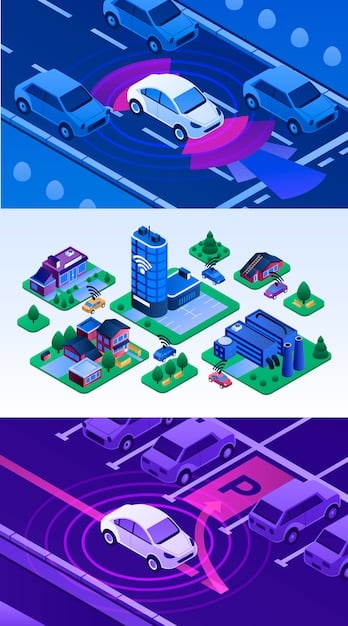Smart Parking Solutions: Revolutionizing Urban Mobility in the US

Smart parking solutions are transforming urban landscapes across the US by leveraging technology to optimize parking availability, reduce traffic congestion, and enhance the overall efficiency of city infrastructures.
Navigating the maze of urban parking can be a daily frustration. But what if technology could transform this experience, making it smoother, faster, and more efficient? Smart Parking Solutions: How Technology Can Improve Urban Mobility and Reduce Traffic are not just a futuristic concept; they’re a present-day reality rapidly reshaping cities across the US, offering a glimpse into a more connected and livable urban future.
Understanding smart parking solutions
Smart parking solutions are more than just digital meters; they represent an integrated approach to managing parking resources using a variety of technologies. These systems aim to provide drivers with real-time information, optimize parking space utilization, and ultimately, reduce the frustrations associated with finding a parking spot in crowded urban areas.
Key components of smart parking systems
At the heart of smart parking is a network of interconnected devices and platforms. These include sensors, communication networks, data analytics, and user interfaces, all working in harmony to provide a seamless parking experience.
How smart parking alleviates urban challenges
By implementing smart parking solutions, cities can tackle issues that plague congested urban environments. From decreasing traffic caused by drivers circling for parking to reducing emissions and enhancing the overall efficiency of urban mobility, the benefits are substantial.
- Real-time parking availability: Provides drivers with up-to-the-minute data on available parking spaces, reducing search times.
- Optimized space utilization: Maximizes the use of existing parking infrastructure, accommodating more vehicles in the same area.
- Reduced traffic congestion: Minimizes the number of vehicles circling for parking, leading to smoother traffic flow.
- Lower emissions: Decreases vehicle idling and search times, contributing to a reduction in harmful emissions.
In essence, smart parking is a cornerstone of the smart city concept, enhancing the quality of urban life by streamlining transportation and resource management.
The technology behind smart parking
The effectiveness of smart parking solutions hinges on the advanced technologies that power them. These range from simple sensors to sophisticated data analytics platforms, all working together to create a smarter, more efficient parking ecosystem. Understanding these technologies is key to appreciating the full potential of smart parking.

Sensor technology: The eyes of the system
Parking sensors are the fundamental component of smart parking, providing real-time data on whether a parking space is occupied or vacant. These sensors can be embedded in the pavement or mounted overhead and utilize various detection methods such as magnetic, ultrasonic, or infrared technology.
Data analytics: Turning information into insights
The data collected by parking sensors is fed into sophisticated analytics platforms, which process and analyze the information to provide valuable insights. This includes identifying peak parking times, optimizing pricing strategies, and predicting future parking demand.
- Mobile apps: Allow drivers to easily locate and navigate to available parking spots.
- Payment systems: Enable seamless mobile payments for parking, eliminating the need for physical meters.
- Navigation integration: Integrates parking information with navigation systems to guide drivers directly to available spaces.
Together, these technologies create a synergistic effect, transforming the parking experience into a seamless and efficient part of urban mobility.
In conclusion, the interplay between sensor technology, data analytics, and communication networks enables smart parking solutions to provide real-time information, optimize resource utilization, and enhance the overall parking experience.
Benefits of implementing smart parking
The adoption of smart parking solutions brings a wealth of benefits that extend far beyond simply finding a parking spot more easily. These advantages impact drivers, city administrators, and the environment, making smart parking a win-win solution for all.
For drivers: Convenience and time savings
For drivers, the most immediate benefit of smart parking is the convenience of quickly locating available parking spaces. This not only saves time but also reduces the stress and frustration associated with searching for parking, leading to a more pleasant urban experience.
Environmental impact: Reducing emissions
By minimizing the amount of time vehicles spend circling in search of parking, smart parking solutions contribute to a significant reduction in emissions. This helps improve air quality and reduces the carbon footprint of urban areas, aligning with sustainability goals.

- Optimized parking revenue: Allows cities to dynamically adjust parking rates based on demand, maximizing revenue generation.
- Improved urban planning: Provides valuable data on parking patterns, helping city planners make informed decisions about infrastructure development.
- Enhanced public safety: Reduces traffic congestion and improves traffic flow, leading to safer streets for pedestrians and drivers alike.
In conclusion, the benefits of smart parking are threefold. For drivers, it brings convenience and time savings; for the environment, it reduces emissions; and for cities, it optimizes revenue and enhances urban planning.
Challenges and considerations
While the potential benefits of smart parking solutions are significant, their implementation is not without its challenges. Cities must carefully consider these factors to ensure that smart parking initiatives are successful and provide a positive return on investment.
Initial investment and infrastructure costs
Deploying smart parking systems requires a significant upfront investment in sensors, communication networks, and software platforms. Cities must carefully evaluate the costs and benefits to determine the economic feasibility of these projects.
Data privacy and security concerns
Smart parking systems collect and store vast amounts of data about drivers and their vehicles, raising concerns about privacy and security. Cities must implement robust data protection measures to safeguard this information and prevent unauthorized access.
Integration with existing infrastructure
Integrating smart parking solutions with existing transportation infrastructure and payment systems can be complex. Cities must ensure that new systems are compatible with legacy technologies to avoid disruptions and maximize efficiency.
In conclusion, successful implementation of smart parking requires careful planning and consideration of investment costs, data privacy concerns, and integration with existing infrastructure. By addressing these challenges proactively, cities can unlock the full potential of smart parking and create more connected, efficient, and sustainable urban environments.
Case studies: Successful smart parking implementations in the US
Across the US, numerous cities have successfully implemented smart parking solutions, demonstrating their effectiveness in addressing urban mobility challenges. These case studies provide valuable insights into the strategies, technologies, and outcomes of smart parking initiatives.
Los Angeles: Optimizing parking in a sprawling metropolis
Los Angeles has deployed smart parking technology to manage its vast network of parking spaces. By providing real-time parking information and optimizing space utilization, the city has reduced traffic congestion and improved the parking experience for residents and visitors.
San Francisco: Pioneering mobile payment solutions
San Francisco has been a leader in implementing mobile payment solutions for parking. Through its SFpark program, the city allows drivers to pay for parking using their smartphones, eliminating the need for physical meters and streamlining the parking process.
New York City: Enhancing parking enforcement
New York City has utilized smart parking technology to improve parking enforcement. By equipping parking enforcement officers with handheld devices that provide real-time parking data, the city has increased efficiency and reduced parking violations.
These case studies serve as compelling examples of how smart parking solutions can be tailored to meet the unique needs of different cities. By adopting innovative technologies and strategies, cities across the US are transforming their parking landscapes and creating more livable, sustainable urban environments.
The future of smart parking
As technology continues to evolve, the future of smart parking holds even greater promise. From autonomous vehicles to advanced analytics, several trends are poised to shape the next generation of smart parking solutions.
Integration with autonomous vehicles
The rise of autonomous vehicles will revolutionize parking, as these vehicles will be able to park themselves in the most efficient and convenient locations. Smart parking systems will play a crucial role in guiding autonomous vehicles to available parking spaces and managing parking resources.
Predictive analytics and demand forecasting
Advanced analytics will enable cities to predict future parking demand with greater accuracy. This will allow them to dynamically adjust parking rates, allocate resources more efficiently, and optimize the parking experience for drivers.
Sustainability and eco-friendly parking solutions
The future of smart parking will be closely linked to sustainability. Cities will increasingly adopt eco-friendly parking solutions, such as electric vehicle charging stations and green parking infrastructure, to reduce their environmental impact.
In summary, the future of smart parking is characterized by greater integration with autonomous vehicles, more sophisticated use of predictive analytics, and a stronger emphasis on sustainability. These trends will create smarter, more efficient, and more environmentally friendly urban environments.
| Key Point | Brief Description |
|---|---|
| 📍 Real-Time Data | Provides up-to-the-minute info on parking spots, reducing search time. |
| 🚗 Traffic Reduction | Minimizes circling for parking, smoothing traffic flow. |
| 💨 Emission Control | Decreases idling, contributing to lower harmful emissions. |
| 💰 Revenue Increase | Cities can optimize pricing based on demand, maximizing parking revenue. |
What are the main benefits of smart parking?
▼
Smart parking reduces traffic by guiding drivers directly to available spots, minimizing the time vehicles spend circling and searching. This improves traffic flow and reduces overall congestion.
▼
Smart parking systems utilize a variety of technologies including sensors for detecting parking space occupancy, mobile apps for navigation and payment, and data analytics for optimizing parking management.
▼
Smart parking provides valuable data on parking patterns and demand, helping urban planners make informed decisions about parking infrastructure development and resource allocation within the city.
▼
Yes, smart parking solutions contribute to a greener environment by reducing vehicle idling and search times, which leads to lower emissions and improved air quality in urban areas.
▼
The main concerns include the initial investment costs, data privacy and security, and the need for seamless integration with existing infrastructure and payment systems to ensure smooth operation.
Conclusion
Smart Parking Solutions: How Technology Can Improve Urban Mobility and Reduce Traffic represent a transformative approach to urban management, offering a multitude of benefits for drivers, city administrators, and the environment. By embracing these innovative solutions, cities across the US can create more livable, sustainable, and efficient urban environments for all.





